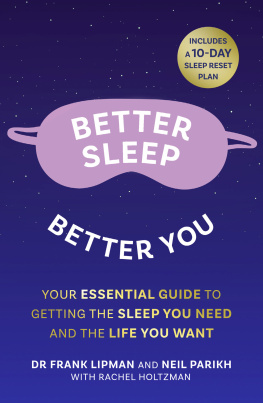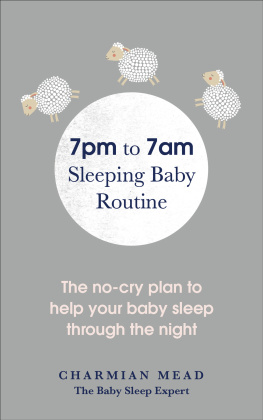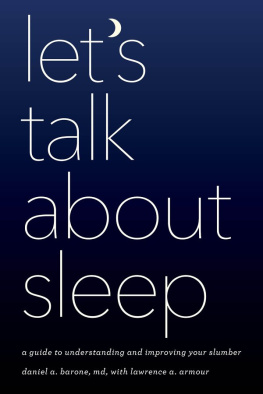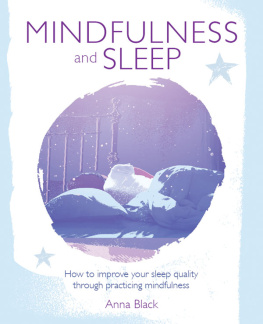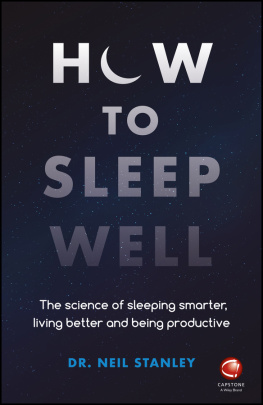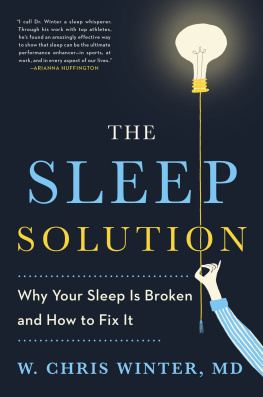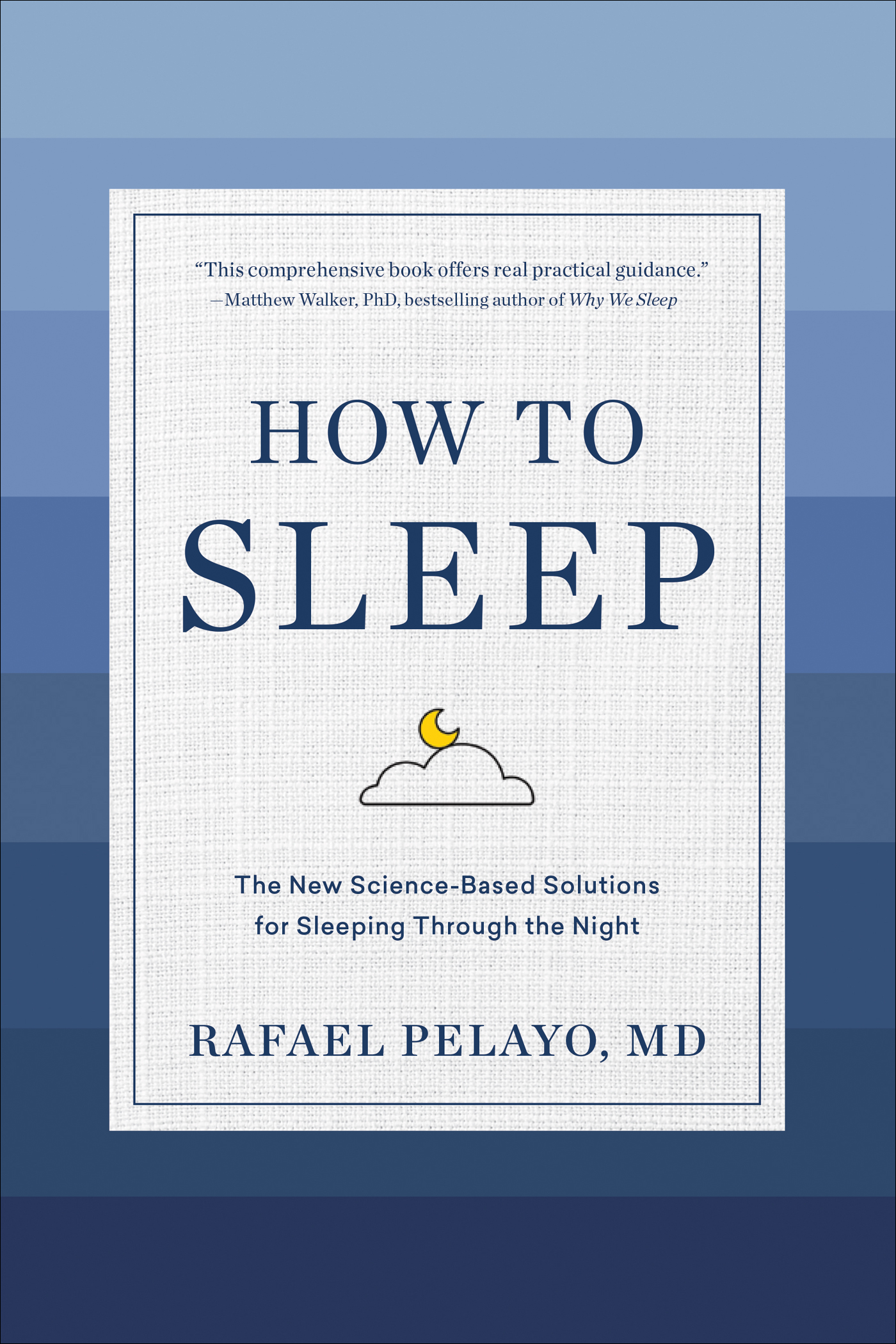Contents
Guide
Page List
How to
Sleep

The New Science-Based Solutions for Sleeping Through the Night
rafael Pelayo, MD

Dedicated to the legacy of my friend William Dement, who made the world a better place
CONTENTS
Introduction
Everybody sleeps. In fact, youve been sleeping longer than youve been eating food or breathing air. (We may even dream in the weeks before we are born.) Sleep science pioneer Dr. Allan Rechtschaffen once said, If sleep has no function, it is the biggest mistake made by evolution. Its no mistake: Though the functions of sleep have long been considered a mystery, scientific data increasingly show that sleep is how humans bodies and brains are restored and recharged. Our metabolisms require it. Little wonder that we wake up feeling cranky and unfocused when we dont sleep well. Nothing consistently makes you feel better than a good night of sleep.
But on any given night, about half of us think we dont sleep well. Routinely waking up feeling irritable and tired is the first sign that you may have a sleep problem. Sleep difficulties affect millions of peopleand the problem is getting worse. The Centers for Disease Control and Prevention has described sleep disorders as an epidemic in our society.
You can sleep better. And after reading this book, you will sleep better. As a sleep-medicine physician, I can say that with confidence. In my more than twenty-five years of practice, Ive seen again and again that sleep patients are capable of major improvementso long as theyre given the right rules to follow.
The Old Rules Dont Work
News stories about this sleep epidemic often conclude with a similar litany of advice referred to collectively since the 1970s as sleep hygiene rules. The term sleep hygiene, widely used by both health professionals and the general public, refers to isolated recommendations of things to avoid, such as Dont read in bed, Dont drink coffee close to bedtime, Dont watch TV in bed, and Dont drink alcohol before bedtime. The concept, popularized by the late great Dr. Peter Hauri, was well-intentioned and has helped generate awareness of the importance of sleep. But despite the popularity of these old rules, improving ones sleep hygiene alone is rarely effective in helping people with serious sleep problems.
In my practice, Ive found that sleep hygiene rules are a well-meaning but simplistic shortcut approach to difficulties in sleeping. Expecting sleep hygiene alone to help a person with chronic sleep difficulties is like telling somebody with an anxiety disorder to stop worrying. Almost every new patient I see tells me they already practice sleep hygiene. Many of these patients are able to recite the usual sleep hygiene rules backward and forward, but they still have trouble sleeping. Despite knowing these rules for decades, millions of people continue to battle sleep difficulties.
The data collected so far back me up: According to the American Academy of Sleep Medicine, research clearly shows that the efficacy of sleep hygiene rules alone is weak and inconclusive at best. This is because applying those rules ignores the core issues that cause sleep disorders. If anything, it can backfire, because when people try to use sleep hygiene rules and still sleep poorly, they blame themselves or become resigned to poor sleep because theyve tried everything. Its a kitchen-sink approach that fails to address each persons specific issues.
The New Sleep Rules
Based on my years of clinical experience with patients, scientific research, and community outreach work, I know that people can develop better, smarter, long-lasting sleep patterns. What follows are a new set of rules designed to reflect the growth of knowledge in sleep science and offer a clear path to effectively improving your health. It all begins with making quality sleep a priority, which youve already begun to do, just by opening up this book!
In chapter one well take a step back and Ill explain how sleep works as part of our biology, why we sleep, and how sleep is essential for our waking life. I have found that putting peoples personal sleep challenges in context quickly changes their perspective. In chapter two well take a deep dive into the most common physical impediments to good-quality sleep (beginning with snoring). In chapter three Ill discuss the tips and tools to help rid yourself of insomnia once and for all, and in chapter four Ill not only address how everyday lifestyle choices (such as what we eat and drink and how we exercise) affect sleep, but also take a clear-eyed look at sleep remedies that workand those that dont. A brief survey of troubling but less common sleep disorders like sleepwalking and narcolepsy follows in chapter five, and because it is never too soon or too late to learn how to improve your sleep, in chapter six Ill offer strategies that apply to infants, seniors, and everyone in between. Chapter seven tackles the wondrous realm of dreams and the exciting science behind the miracle of the sleeping mind.
If, after reading the preceding chapters, you still have trouble sleeping or feel you need some extra help to resolve your sleep difficulties, then you may need to see a sleep-medicine physician. In chapter eight Ill guide you through a virtual visit to a sleep doctor to show you how a combination of state-of-the-art technology and old-fashioned medical sleuthing can help determine what exactly is disrupting your sleep.
The information in this book will help you sleep better, wake up refreshed, and have a healthier life. Its time to put the sleep-disorder epidemic to bed.
one
HOW SLEEP WORKS
Before you can sleep better (and you will sleep better), you need to understand the biology of normal sleep. Early scientists believed that sleep was little more than an inactive state. It wasnt until brain-wave activity could be reliably monitored that we discovered that our journey through the night is fascinating and complexand far from inactive. There is a lot going on while were sleeping, and scientific studies of the sleeping brain are revealing not only how the human organism functions during sleep but also how our sleep affects us while were awake. The mystery of sleep is no longer so mysterious.
Circadian Rhythms
Inside our heads is whats known as the circadian or biological clock. This miniature timekeeper consists of a tiny cluster of neurons that shares one purpose: to synchronize the bodys biological rhythms with the earths cycles of dawn and dusk.
This clock is located in the perfect place: at the base of the brain, right behind our eyes and above the junction of our optic nerves, which transmit information to the circadian clock about the light that is coming into our eyes. (The fact that this small region has the best blood supply in the entire brain underscores its vital importance. A person who suffers a major stroke is much more likely to lose their ability to speak or move their hand than suffer damage to their circadian clock!)
The circadian clocks internal rhythm runs slightly longer than twenty-four hours, to predict the incremental changes in the earths rotational tilt that affect the length of our days and nights across the seasons, so it tends to overshoot. But it resets at the first burst of light to hit our eyes when we wake in the morning. Once the brain knows what time the light hits our eyes, it can predict that dawn will occur around the same time the next day. This is essential to our survival: In our ancient past, if we left the safety of the village or caves we lived in, we had to ensure wed be back to our homes before dusk, when nocturnal predators became active. But if we left too late or returned too early, we wasted potential daylight to hunt and gather.


